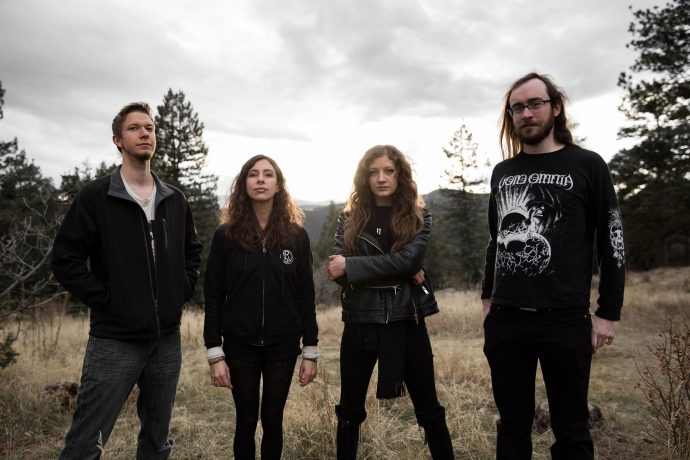
(Here we are, at the end of December and the end of 2019, and just under the wire Andy Synn has turned in his SYNN REPORT for the month, choosing to review all the albums by the Colorado band Dreadnought, including their latest album Emergence, which was released in September by Profound Lore.)
Recommended for fans of: Madder Mortem, Ludicra, (latter-day) Opeth
Having dedicated the last several editions of The Synn Report to the nastier, gnarlier end of the musical spectrum, I felt it would be fun to end the year in something a little bit proggier.
Actually, make that a LOT proggier, as the multi-instrumental marvels of Dreadnought (whose repertoire accentuates the traditional form of bass, guitar, drums, and vocals, with added embellishments from flute, piano, mandolin, and saxophone, to name but a few) arguably err more towards Folk, Prog, and Jazz – particularly on their earlier albums – than they do Metal.
That’s not to say that the Colorado quartet don’t have their more metallic moments, as they’re entirely capable of deploying a writhing, blackened riff or snarling shot of vocal venom whenever the need calls for it, but these harsher, heavier elements are just one small part of a rich creative tapestry which favours patient, proggy melody and indulgent artistry over instantaneous impact.
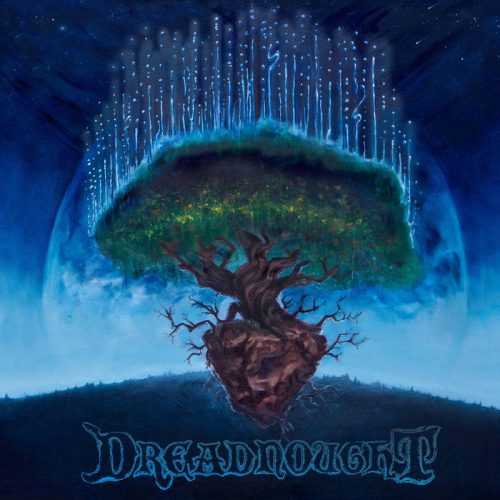
LIFEWOVEN – 2013
For many bands their first album is still something of a testing ground, where they’re still sorting out exactly who they are and who they want to be. And while that’s certainly true to an extent when it comes to Lifewoven, it’s also true that, with the benefit of hindsight and context, it’s painfully clear how early on the band were already planting the seeds of their own future.
Opener “Nascence” is a ten-minute Folk-Prog odyssey, akin to a cross between Fairport Convention, Opeth, and Godspeed You! Black Emperor, and while it is, when compared to the band’s later works, a little rough around the edges at times, its strange blend of whispering flute, twinkling piano, indulgent leads, and bare-bones riffs immediately marks the band out as something unusual.
This impression is only reinforced by the irrepressible instrumental strains of “Lift” – think mid-period Anathema meets ’70s Acid-Prog and rustic hippy-folk – and the significantly more metallic “Deluge”, which provides an intriguing mix of moody Doom-Jazz and stripped-down Black Metal, punctuated here and there by a shamelessly proggy solo or pensive passage of brooding ambience.
The similarly scintillating “Utopia” is – barring an injection of visceral vocals from singer Kelly Schilling – pure, unabashed Prog from start to finish, from Schilling’s intricate, atmospheric fretwork to the chiming ivories of keyboardist Lauren Vieira to the effortlessly creative, jazzy patterns conjured up by the rhythmic duo of Kevin Handlon (bass) and Jordan Clancy (drums).
“Immolate”, the album’s shortest song (by a significant margin), is just under five minutes of Progressive Jazz Doom which somehow feels like it contains more music, and more ideas, than should be possible in such a short time, but which also passes by in the blink of an eye. And yet none of the musical motifs or exotic elements involved feel underdeveloped or shortchanged as a result.
Concluding with the unexpectedly laid-back (well, right until the end) “Renaissance”, a song which really lets Vieira flex her proggy muscles behind the keys, while also acting as one final showcase for the band’s unconventional (and still evolving) hybrid of sounds and styles, Lifewoven may well be the band’s most overtly and unremittingly Proggy work, and while it certainly wears many of its influences proudly upon its sleeve, it also sets out a clear blueprint for the band’s future.
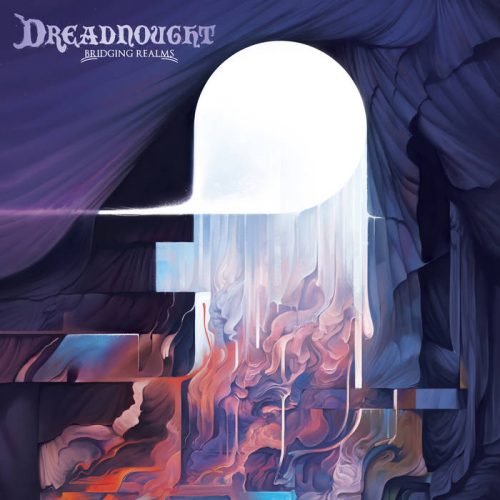
BRIDGING REALMS – 2015
If Lifewoven was (and remains) the band’s most overtly Proggy/Folky statement, then Bridging Realms is definitely their jazziest.
Just take a listen to opener “Ode to Ether”, with its ambient, sax and flute-led intro, passages of clamorous, piano-driven doom and dazzling, stream-of-consciousness style finale – every piece and every part of this song just has this jazzy, free-form fluidity and sense that anything might happen next.
Second song “Odyssey” (fittingly the album’s longest at an imposing fourteen minutes) is similarly jazzed and juiced up, moving from smooth, seductive melody to proggy, doom-tinged power, to artful avant-garde ambience to eclectic, acrobatic instrumentation (particularly from Handlon and Clancy) with masterful poise and control, somehow feeling both effortlessly spontaneous and carefully controlled (yet never contrived) at the same time.
The album’s mid-point, “Minuet de Lune”, has an almost Porcupine Tree-esque feel to it, echoing both the ardent emotion and eccentric instrumental embellishments of Steven Wilson and co. without simply aping them, while “Transpiration” leans heavily on both Vieira’s nimble fingers and the clever interweaving of her voice with Schilling’s to extract the maximum amount of emotion and engagement from what is one of the album’s proggiest and most deliciously decadent numbers.
Dreadnought arguably save their very best for last though, as the title-track fuses everything that makes the band so good – piano-driven smooth-jazz licks, soaring vocal harmonies, punchy Prog-Doom riffs, hypnotic rhythms, and subtle, folkish flavours – into a single song which not only provides the album with a more than worthy finale, but which will also keep you coming back for more again and again.
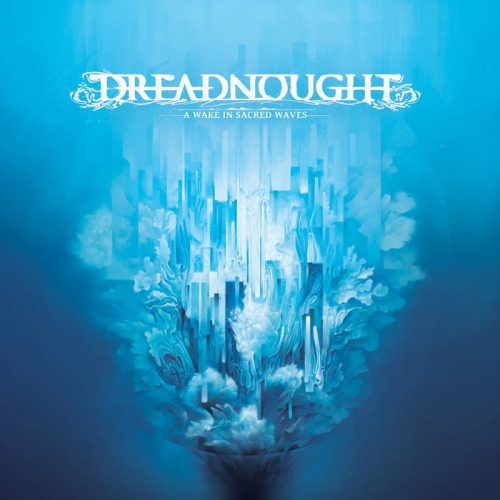
A WAKE IN SACRED WAVES – 2017
Three albums in and Dreadnought weren’t just finding their groove, they were taking significant steps to make it bigger and better than ever, reining in some of their more ostentatiously jazzy and/or folky inclinations so as to follow a more prog-focussed path.
The opening bars of “Vacant Sea” place the focus firmly on Schilling’s ethereal vocals, beneath which a plaintive piano line is tenderly picked out. A little while later, the mood and tone of the piece now fully established, the whole thing is turned upon its head by a sudden deluge of distorted guitar and heart-rending shrieks, which in turn gives way to a patient procession of trilling keys and hypnotic percussive patterns. The rest of the song’s seventeen minute run-time then proceeds in a similarly unpredictable, yet enviably fluid fashion, moving nimbly from doomy grandeur to blackened ardour to introspective, noirish minimalism (shades of Bohren & Der Club of Gore) to intense, proggy excess.
“Within Chanting Waters” maintains the same fluid dynamic as its predecessor, but opts for a tighter and more focussed structure, using its opening minutes to lay down a firm foundation of taut, proggy riffs and organic energy (full credit going to drummer Jordan Clancy for his continually impressive performance), before switching tack to explore darker, heavier waters, ultimately building from a series of atmospheric instrumental layers towards a stunning conclusion that’s both doomy and delicate.
The early minutes of “To Luminous Scale” are a hypnotic slow-burn of subtle drum work and haunting, wordless harmonies, building towards the track’s brilliantly multi-faceted mid-section – all evocative, atmosphere-heavy guitars, reverberant piano lines, and crisp, creative drum work, topped off with Schilling’s versatile clean/harsh vocal interplay – after which the song’s finale offers up a masterclass in moody melody and brooding ambience.
Concluding with the mesmerising strains of “A Drifting Reign” – arguably the album’s heaviest, or at least most intense, song, as well as the one which exploits the classic quiet/loud dynamic to its fullest, moving from intricate layers of complex drums and thrumming guitars to passages of poignant, aching ambience, and back again – A Wake in Sacred Waves ends precisely as it began, in beguiling, beatific, occasionally bombastic, style.
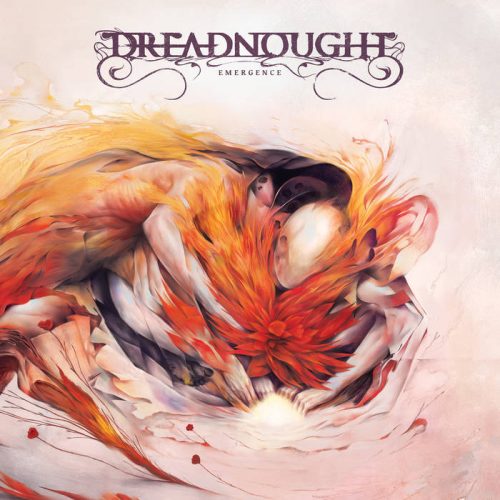
EMERGENCE – 2019
On their most recent album – the fourth and final part of the band’s loose conceptual cycle based around interpretations of the classical four elements – Dreadnought maintained the more fluid, cohesive writing style from ...Sacred Waves while also giving things an even darker, doomier hue.
This is immediately apparent on opener “Besieged”, with its moody, Opeth-ian guitars, bigger, more brooding bass tone, and more forceful, yet still nuanced, drum work. But while the atmosphere of this track is undeniably darker than ever, the music itself remains just as compelling and captivating, from the eloquent interplay of Schilling and Vieira’s voices to the instrumental (in more ways than one) shifts between pure proggery, melancholy melody, and sharp metallic bite.
The mostly ambient interlude of “Still” eventually gives way to the Prog-Doom powerhouse of “Pestilent”, which finds drummer Jordan Clancy continuing to lay down a series of thrillingly artistic percussive arrangements beneath Schilling’s textured, atmospheric guitar work, all of which, when combined with Kevin Handlon’s ever-present bass, serves to make this track one of the moodiest and most ominous cuts (even during its most stripped-back moments) which the band have ever written.
“Tempered” continues to expand upon this album’s blueprint of doomy eloquence and progressive flair, juxtaposing some surprisingly meaty riffs and punchy percussion against layers of indulgent synth-led soundscapes and sublime vocal melodies in a way that’s both delicately soothing yet deeply unsettling.
For “The Waking Realm”, the record’s fittingly phenomenal finale, the band pulled out all the stops, building from eerie, entrancing ambience (think Anathema at their most vulnerable) to a titanic finale of blasting drums and scalding shrieks (think Arcturus at their wildest), in between which they effortlessly weave together threads of all their inspirations, influences, and ideas in a way that simultaneously obscures the song’s shape while also making you desperate to see what form it finally takes at the end.
Ultimately Emergence isn’t just the doomiest, or darkest, album of the band’s career. It’s also their most cohesive and, arguably, most immersive. And while it’s not necessarily an easy listening experience (for all its shamelessly melodic proclivities) it’s the sort of album that rewards the listener ever more richly the more attention they’re willing to dedicate to it.

This band improves on every release. It’s wonderful to see bands grow and master their own music!